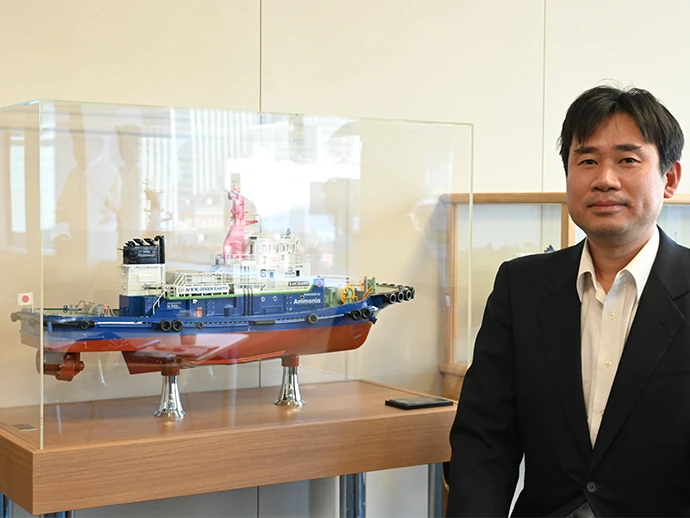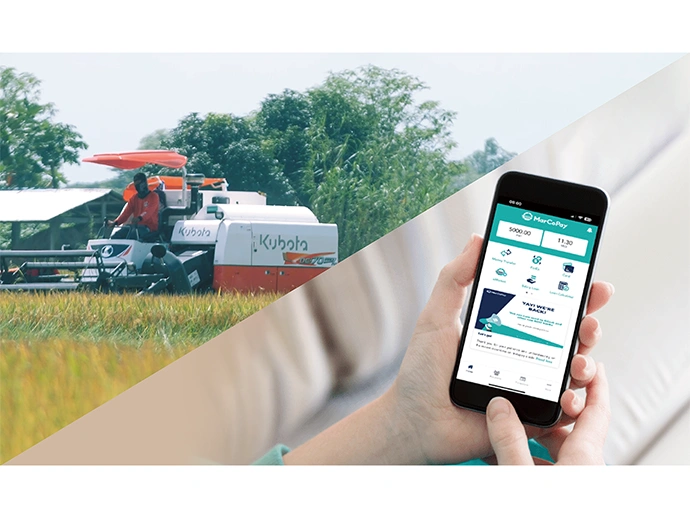Test Engine Operational Combining the Group’s Technological Capabilities to Accelerate the Verification of New Fuels
Released : May 16, 2025
Updated : May 16, 2025
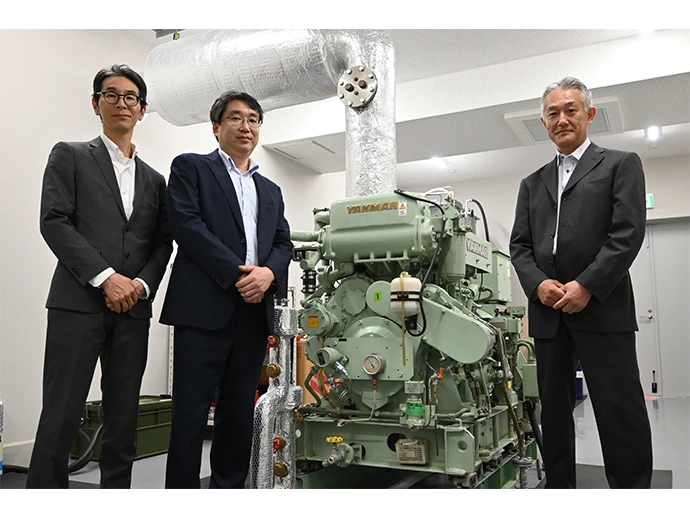
NYK is taking practical and immediate steps to reduce greenhouse gas (GHG) emissions from its vessels by advancing the use of new fuels that are already widely adopted or in the early stages of adoption. One such fuel is biofuel. A key facility to support its application opened in Chiba Prefecture in October 2024. The facility is reusing a generator that had been installed on the tugboat Sakigake before its conversion into an ammonia-fueled tugboat. This generator is now utilized as a test engine to evaluate the safety of using biofuels in conventional engines. The facility embodies the combined technological capabilities of the NYK Group.
GHG Emissions Reduction through Immediate Actions
Biofuel refers to fuel derived from organic resources such as waste cooking oil and other biologically sourced materials. Since the plants used as raw materials absorb carbon dioxide (CO₂) from the atmosphere during their growth process, the CO₂ emissions generated during combustion are considered to be effectively zero. Unlike alternative fuels such as LNG, which require vessels equipped with dedicated engines, biofuels are classified as “drop in fuels” that can be used in existing engines. This means they require no significant additional investment and can be blended with heavy fuel oil. These characteristics make biofuels an effective transitional solution for reducing CO₂ and other GHGs during the shift to a decarbonized future.
The biofuel currently in mainstream use for ships is B24, a blend containing 24% bio-derived fuel and 76% heavy fuel oil. NYK began using this fuel in 2019 and has gradually expanded its application to more refueling ports and vessel types. By the end of December 2024, NYK had conducted over 200 biofuel refueling operations. In April 2024, NYK launched a long-term trial project, transitioning from short-term use to a comprehensive verification phase involving extended usage.
The safety of B24 biofuel used by NYK so far was confirmed through a comprehensive process. This included sample analysis conducted at the laboratory of Nippon Yuka Kogyo Co., Ltd., an NYK Group company specializing in fuel oil analysis and chemical manufacturing, as well as testing and analysis using external engine facilities, followed by small-scale trial use on NYK-operated vessels. As a result, the evaluation period typically spanned one to two years. With the introduction of its own test engine, however, NYK can now conduct stress tests and experiments using 100% biofuel more efficiently. This has enabled the company to shorten the testing period to just two to three months. Shortening the testing timeline and reducing costs associated with these trials are critical to responding to increasing global environmental regulations and growing demand for biofuels and other new fuels. The newly established onshore facility is key to achieving these goals.
Exploring the Potential of “Bio-residue”
One of the fuels used to verify quality in test engines is “bio-residue,” a term that may sound unfamiliar. It refers to a lower-grade fuel derived from standard biofuels. Produced as a byproduct during the refining process of biofuels, bio-residue is a combustible liquid but is considered more challenging to handle compared to conventional fuels. While there have been some instances of its use overseas, comprehensive quality verification has yet to be undertaken. NYK, leveraging the collective efforts of its Group, is taking on this challenge.
Kanefumi Uematsu, manager of the Marine Group’s Marine Engineering Team, stated, “Bio-residue is expected to be more cost-effective than conventional biofuels while maintaining a similar GHG intensity (GHG emissions per unit of energy). Our immediate goal is to ensure that bio-residue can be safely and effectively used in actual operations.
The verification process is as follows. First, samples are procured and analyzed in the laboratory of Nippon Yuka Kogyo (*). Their composition and properties are compared with conventional heavy fuel oil to identify any unique characteristics. Following this, technical verification is conducted by running the biofuel on the test engine.
Some types of bio-residues solidify with temperature changes. Uematsu, a chief engineer with extensive experience in ship engine operations, explains: “When used on ships, bio-residues can cool and solidify in tanks or pipelines. Fuels that solidify easily also tend to produce more soot during combustion. That’s why we are testing them directly with the test engine to evaluate their performance.” The verification process at the test engine is overseen by Uematsu and other professional marine engineers, who carefully examine differences from conventional heavy fuel oil and check for any engine troubles caused by the new fuels. The insights gained from their onboard experience play a crucial role in this process.
Additionally, for conventional biofuels, combustion evaluation tests have been conducted not only on the previously used B24 but also on B100, which consists of 100% bio-derived content. These tests aim to identify potential challenges when used on ships, ensuring readiness for the anticipated demand. (*) Nippon Yuka Kogyo: NYK’s research institute specializing in chemical technologies.
“Create, Operate, Analyze”: Fully Managed within the Group
The first key point in examining bio-residues is whether the engine can operate safely with the fuel. The second is whether any issues arise in the exhaust system. Furthermore, according to Uematsu, “Biofuels are considered organic matter and are prone to deterioration. When biofuels degrade, they can produce acids, leading to corrosion issues with components.” To address this, soot collected from the fuel and exhaust is analyzed at Nippon Yuka Kogyo, and the results are carefully evaluated.
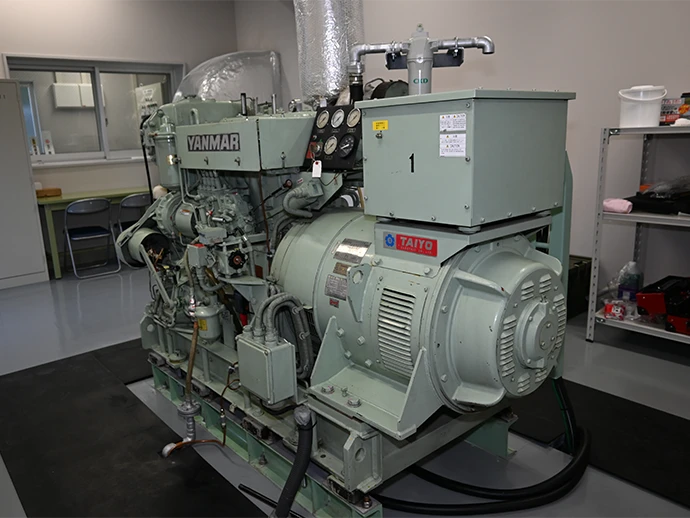
Test engine: a reused generator from the tugboad Sakigake
Bio-residue solidified at low temperature, being tested using the test engine
The establishment of a test engine has eliminated the need to retrieve soot samples from vessels, enabling on-the spot collection. This development has dramatically reduced the time required for analyzing and evaluating potential trouble points. While speed has always been critical in adapting to rapidly changing environmental requirements, this innovation
is poised to effectively meet those high expectations.
Key factors such as onboard storage, blending stability, equipment impact, and exhaust emissions are evaluated by utilizing property analysis data and the data obtained from the test engine. Based on these evaluations, an operation manual is created for practical implementation. Furthermore, feedback from data obtained during actual ship operations is incorporated into the operation manual, with the goal of achieving zero operational troubles.
Atsushi Takeda, general manager of the Technical Research Division at Nippon Yuka Kogyo (Ph.D. in Engineering), stated: “Biofuels are chemically processed fuels. If they are perfectly processed, the degree of degradation or acid formation would likely be minimal, but there are still many unknowns about the characteristics of bio residues. We will continue our research.”
Nippon Yuka Kogyo also develops and provides additives to prevent the fuel from solidifying, which can cause engine trouble. If any issues are identified through property analysis data or test-engine usage, the company plans to develop new additives to resolve them.
Boltech Co., Ltd., an engineering company in the NYK Group, designed and constructed the facility’s equipment, including the test engine. A generator previously installed on Sakigake was overhauled at Boltech’s factory before being installed in the facility.
Given that the facility is for testing new fuels, the possibility of the test engine malfunctioning has been anticipated, and Boltech is responsible for maintenance in such cases. Masumi Toriumi, staff group leader of the Sales Group, said, “This will provide an opportunity to observe the engine’s condition when using the latest fuels. Having a functioning test engine on-site will also contribute to improving our maintenance skills.”
When the test engine runs, the noise level replicates that of an engine room aboard a ship, making conversation impossible. However, stepping outside the facility doors reduces the noise to barely audible levels. To mitigate the noise and odor, the facility was strategically located away from residential areas, and the highly airtight building ensures effective noise control. Boltech was also responsible for constructing the building. Toriumi stated, “Our experience in maintaining landbased power generation facilities has proven valuable when complying with regulations and filing necessary applications.”
This project integrates the group’s technological capabilities to tackle new fuels. It encompasses fuel analysis, additive development, test engine operation, and maintenance. The culmination of these various technologies will enable the realization of low- and zero-carbon shipping through new fuels, forming the foundation for the safe operation of NYK Group vessels.
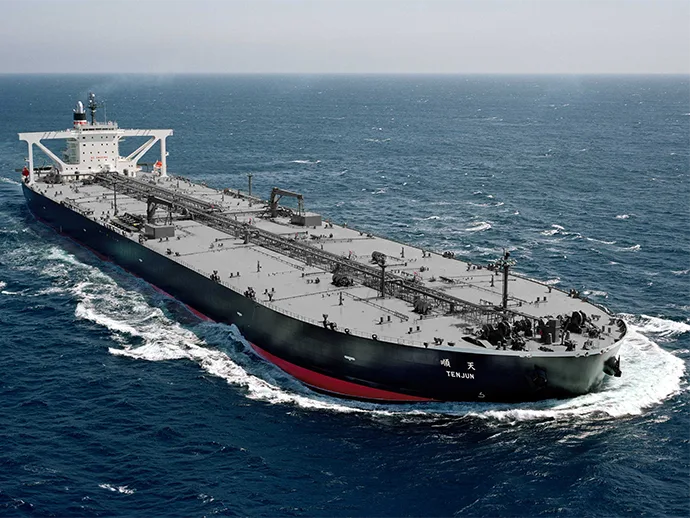
Long-term biofuel test run on board Tenjun, a very large crude oil tanker (VLCC)
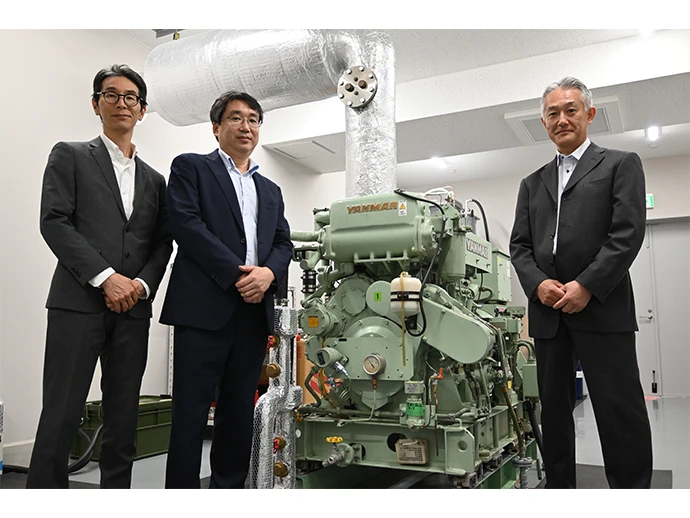
Utilizing the collective strength of the Group to operate the test engine. From left: Masumi Toriumi, Kanefumi Uematsu, and Atsuki Takeda.
Interview with the Project Manager
New Technologies: Building on Existing Foundations
Kanefumi Uematsu
Chief Engineer, Manager, Marine Engineering Team, Marine Group
ー Can you tell us about your career journey so far?
Prior to my appointment as chief engineer, I spent about ten years exclusively at sea, with no shore-based assignments. My first shore-based role was with NYK Shipmanagement Pte Ltd, a ship management company within our group in Singapore, where I was involved in ship management operations. Later, I took on a role in containership owner operations in the sales and marine engineering team at NYK Group South Asia Pte. Ltd., a local entity in Singapore. After returning to sea service, my career took me to the Marine Group’s Marine Engineering Team, then to MTI Co., Ltd., an NYK Group company, before I ultimately rejoined the Marine Group’s Marine Engineering Team for my current role.
ー Can you explain your current work evaluating the safety of biofuels using a test engine?
On October 1, 2024, we established a test engine facility in Chiba Prefecture to evaluate the safety of operating new fuels in internal combustion engines. Currently, our main objective is to quantitatively assess the use of new biofuels in marine engines and the impact of their continued use by collecting and analyzing operational data from this test engine. We aim to significantly shorten the implementation timeline by transitioning the trial phase previously conducted on board to land-based test engines.
The test engine project was initiated under favorable conditions and societal support. As a responsible team member, I approached each uncertainty with a mindset of “You won’t know until you try” and “Progress requires action,” resolving issues carefully one by one. My past experiences at MTI and with the Marine Engineering Team have been invaluable in tackling this unprecedented project. My long-held ambition since my MTI days has always been to figure out how we could acquire a test engine—this question has been a strong motivator throughout this endeavor.
When working on groundbreaking projects like this, it is crucial to take a broad view of challenges and opportunities, make well-considered decisions, and streamline the project’s direction. I have once again recognized the necessity of overseeing the entire project from both macro and micro perspectives and determining priorities as needed.
ー What principles do you value?
The two principles I value most as an engineer are “Engaging sincerely with technology” and “Not being easily swayed.” The first principle means understanding that engineering deals with physical laws and mechanisms that operate without deceit. Machines do not lie; if approached with sincerity, they will deliver results. Conversely, neglect or lack of sincerity will eventually lead to setbacks. For engineers, it is essential to genuinely engage with technology and machinery.
The second principle applies not only to my work in the sales and marine engineering team or when maintaining equipment on a vessel but also to developing new technologies or working in the technical division. It means not being swayed by baseless noise or transient, irresponsible opinions. Engineers must strive to cultivate the ability to “remain calm at all times and discern what is truly necessary.” If the situation deviates from what can be deemed “credible facts as an engineer,” they should approach it with the determination to confront and challenge it. If we fail to focus on truly important matters and instead take the easy way out, it will lead to no solutions and merely postpone the problems for future colleagues.
ー What message do you have for younger marine engineers?
I encourage all engineers to steadily accumulate knowledge, experience, and expertise in their field. New technologies are always built upon existing ones. The current environment is changing in ways that were unimaginable in the past, with fuel transitions being a prime example. When handling ammonia fuel, for instance, we draw on our experience with LNG (a similar type of gas-based fuel) and apply the knowledge and insights we have gained to develop new solutions. The introduction of new fuels does not mean creating everything from scratch. From an engineering perspective, new technologies are built layer by layer upon the foundation of existing ones. This is why the daily accumulation of experience and knowledge is so significant.
This article was re-edited from the Special Issue of KAIJI PRESS published on March 25, 2025.
